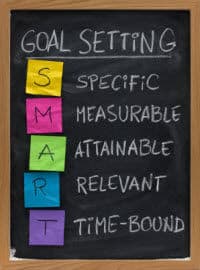Whether your goals are personal or professional, setting SMART goals is the first step to actually achieving them
“A goal properly set is halfway reached.”
~ Zig Ziglar
1. Background
ALTHOUGH its origins are unclear, SMART goal setting appears to have been first used by Peter Drucker in his 1954 book “The Practice of Management”.
2. Relevance
Where ever you are right now, you most likely have bright dreams for the future. You may want to publish a book, get your dream job in consulting, boost company profits by 50%, or take a much deserved luxury holiday to the Maldives. The future is a bright beacon of hope where your imagination is the limit and anything is possible; but how do you get there?
3. Importance
The only way to make your dreams for the future become a reality is to set clear goals and to achieve them: each day, each month and each year. Whether your goals are personal or professional, setting SMART goals is the first step to actually achieving them.
4. SMART Goals
Specific
Measureable
Achievable
Relevant, and
Time-Bound.
4.1 Specific
Your goal should be specific. Goals must be clearly defined and describe what will happen in as much detail as possible. Clearly defined goals are helpful because they allow you to focus on taking action rather than trying to define and understand the goal. For example, a goal to “increase company profits” could be replaced by a more specific goal to “increase profits in each division of the company by at least 5% with 12 months.” Vague goals are no good because it is not be possible to measure progress or to know whether the goal has been achieved.
If your goal is specific, you should be able to answer the following questions:
- What is the goal? Write the goal down so that you have a record and use action words like “build, organise, complete, create, coordinate, make, develop, plan”. What actions will need to be taken to achieve the goal?
- Who is involved? Who is responsible for each action that will need to be taken? It may help to write in the active voice, for example “John will organise the web-design…” and not “the web-design will be organised…”
- Where will this all happen?
- When will the goal be achieved?
- How high are you aiming? Be specific. For example, are you aiming for 7% profit growth, or is 4% okay?
4.2 Measurable
Your goal should be measurable so that you can track your progress, hold people accountable for their performance, and so that you know when the goal has been achieved. Make sure that you have established criteria for measuring progress toward the goal. Measuring your progress is important because it will help you stay motivated and on track. If you are behind schedule this would be good to know because it gives you the opportunity to re-double your efforts and make up for lost time.
To determine if your goal is measurable, ask questions such as:
- How much?
- How many?
- How will we know when the goal has been achieved?
4.3 Achievable
Your goal should be achievable with the resources available. Your resources include assets such as cash, real property, equipment, intellectual property, the skills of the people involved, and the time available. If your goal is not achievable with the resources available then you will need to create a sub-goal “get more resources!” and achieve that sub-goal before returning to the primary goal.
Your goal can be ambitious but should also be realistic. If you set the goal too high or too low then the goal will not be meaningful and people will lose motivation.
To determine whether the goal is achievable, ask questions such as:
- Can we get it done in the proposed timeframe?
- Do we understand our limitations and constraints?
- Can we do this with the resources available?
- Has anyone else done this successfully?
- Is this possible?
4.4 Relevant
Your goal should be relevant in the sense that it should be consistent with your core values and broader mission. Achieving your goal should move you forwards, not bump you sideways or push you backwards. If your goal is relevant and you are willing to make it a priority then this will help you take ownership of the goal and increase your chances of success.
To determine whether the goal is relevant, ask questions such as:
- Why is the goal important?
- Have we achieved similar goals in the past?
- If the goal is achieved, how will we benefit?
- Is this a priority?
4.5 Time-Bound
You should set a date by which the goal will be achieved. Setting an end point for the goal will allow you to determine whether you are making good progress. In order to meet a fixed deadline you will need to focus your efforts and work efficiently, there is no time to waste. Go. Hurry.
To determine whether the goal is time-bound, ask questions such as:
- When will the goal be achieved?
- Is there a deadline?
For more information on consulting concepts and frameworks, please download “The Little Blue Consulting Handbook“.


6 replies on “Set SMART Goals”
Great post!
I’d like to recommend a goal setting tool at http://www.GoalsOnTrack.com, a very nicely built web app designed for tracking goals and todo lists, and supports time tracking too. It’s clear, focused, easy to navigate, worth a try.
[…] before you start applying to be a consultant. This will save you tons of time, and give you a SMART goal. Now, you may wonder how can you do that? Just stay chill, I will unfold all the details in […]
[…] select a strategy. Set SMART goals to help you achieve the strategy, and commit organisational resources to support it. Hemingway […]
[…] If nothing comes to mind, then don’t worry. The reason that most people have never achieved an audacious goal is because they have never set one. The first step to achieving your audacious goals is to set them. To help you think about goal setting, you may want to review the post on Setting SMART Goals. […]
[…] a business to thrive, it will need to adopt the most promising ideas in order to make smart goals and effective plans. Leaders who fear ideas better than their own only serve to stifle the […]
[…] some SMART goals, use productivity software, focus on one thing at a time, and work in short intense […]